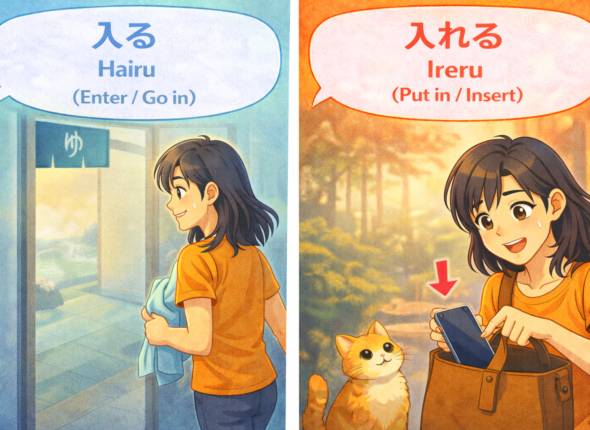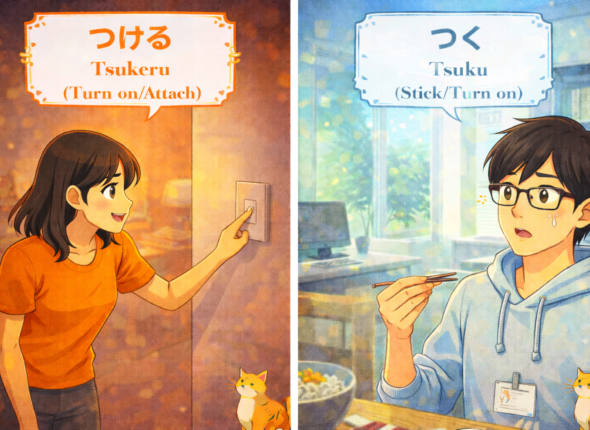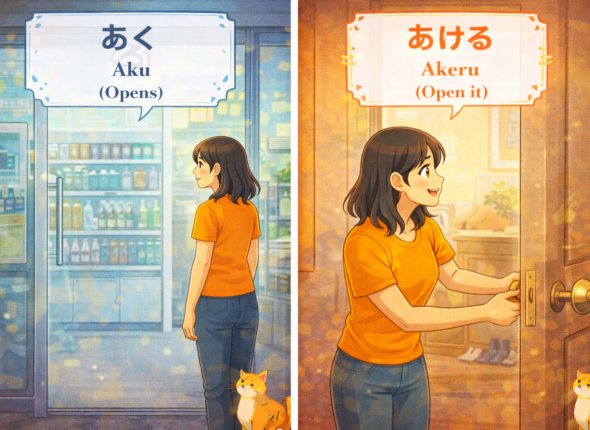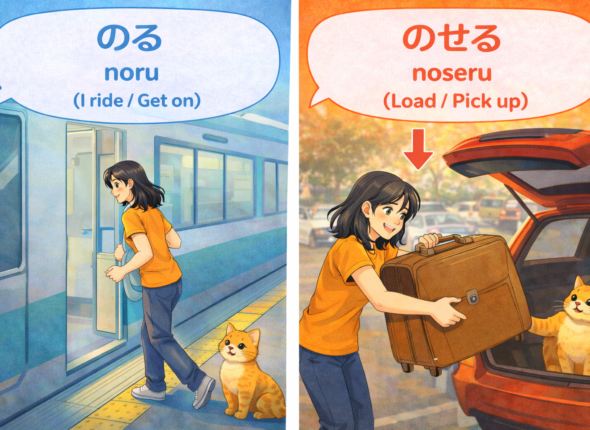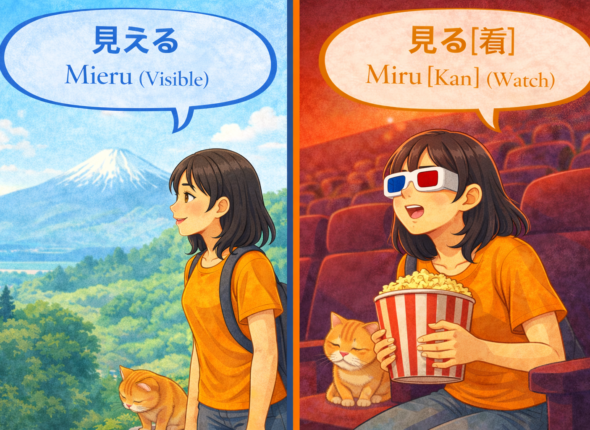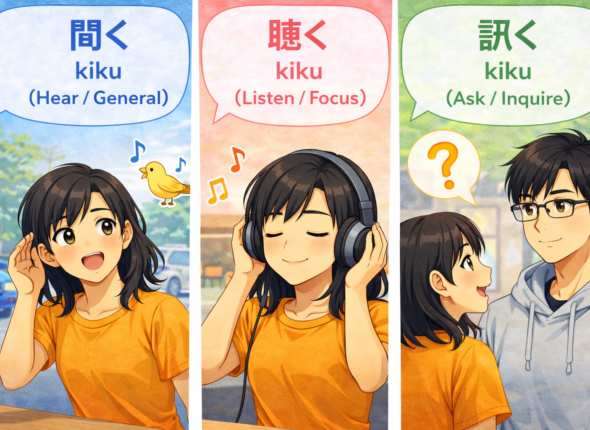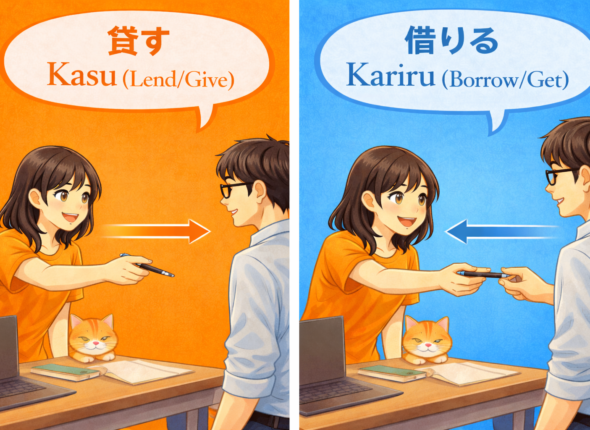Blog
The Difference Between 入る (hairu) vs 入れる (ireru)|Japanese Grammar (N5–N3)
(Joy entering a room [Hairu] vs. Joy putting a phone in a bag [Ireru]) “I enter the room.” (Heya ni hairu) “I put the pen in the box.” (Hako ni pen o...
JAPANESE LEARNING FAQ: What are the features of the online Japanese language school JPLT?
Starting or restarting Japanese study is exciting! But many students hit walls with traditional methods: high tuition fees and knowing grammar but being unable to speak conversationally. JPLT Dialog Plus was created...
JAPANESE LEARNING FAQ: Can I book an appointment?
Thank you for reaching out and showing serious interest in finding the best path to master Japanese! We understand that before committing to a plan, you want to be sure that JPLT...
JAPANESE LEARNING FAQ: What courses are available?
Thank you for contacting JPLT Online Japanese School! It is a pleasure to share details about our curriculum designed to help you master “speakable Japanese”. When asking about our courses, we understand...
JAPANESE LEARNING FAQ:What services do you offer?
Thank you for reaching out to JPLT Online Japanese School! We are excited that you are exploring our services to advance your Japanese language journey. When inquiring about our services, we understand...
JAPANESE LEARNING FAQ:How much do your services cost?
Thank you very much for reaching out to JPLT Online Japanese School! We appreciate your interest in advancing your Japanese skills. It is common for learners to worry about the financial barrier...
日本語学習FAQ:オンライン日本語学校JPLTの特徴は
こんにちは、! JPLTオンライン日本語スクールです。😊 日本語学習を始めたい、または再開したいという熱意、素晴らしいですね! ただ、従来の学習法では「高額な授業料」「文法は知っているけれど、なかなか会話ができない」といった壁にぶつかる方が多いのも事実です。 JPLT Dialog Plusは、そうした学習者様の潜在的な悩みを解決するために生まれました。 🎯 JPLTの核心的な特徴 JPLTは、インプットとアウトプットを自然に両立させ、実践的な「話せる日本語」を習得することに特化した、持続可能でインクルーシブなオンラインスクールです。
「付ける(つける)」と「付く(つく)」の違い [日本語学習]
(電気をつけるJoy [つける] vs. 顔にご飯がついているKen [つく]) 「テレビを つける」と「テレビが ついている」。 一つはあなたがするアクション、もう一つは状態(じょうたい)です。これは「他動詞(つける)」と「自動詞(つく)」の違いです。JoyとKenと一緒にマスターしましょう! 🗣 会話シーン (Conversation Scene) JoyとKenがランチを食べています。 Joy ケンさん、部屋(へや)が暗(くら)いですね。 電気(でんき)を つけましょう か? (Ken, the room is dark. Shall I “turn on” the lights?) Ken お願いします。あ、Joyさん。...
The Difference Between 付ける (tsukeru) vs 付く (tsuku)|Japanese Grammar (N5–N3)
(Joy turning on a light [Tsukeru] vs. Rice stuck on Ken’s face [Tsuku]) “I turn on the TV.” (Terebi o tsukeru) “The TV is on.” (Terebi ga tsuiteiru) One is an action...
「開く(あく)」と「開ける(あける)」の違い [日本語学習]
(自動ドアが開く [開く] vs. ドアを開けるJoy [開ける]) 「ドアが 開(あ)く」と「ドアを 開(あ)ける」。 英語(えいご)ではどちらも “Open” ですが、日本語(にほんご)では使い分(わ)けます。「開く」は自然(しぜん)に動くとき、「開ける」は誰(だれ)かが動かすときです。JoyとKenと一緒にマスターしましょう! 🗣 会話シーン (Conversation Scene) JoyとKenがコンビニの前にいます。 Joy わあ、自動(じどう)ドアですね。 何もしなくても、ドアを 開(あ)けます! (Wow, an automatic door. Even if I do nothing, I “open” the...
The Difference Between 開く (aku) vs 開ける (akeru) |Japanese Grammar (N5–N3)
(Automatic door opening [Aku] vs. Joy opening a door [Akeru]) “The door opens.” (Doa ga aku) “I open the door.” (Doa o akeru) In English, the word “Open” is the same. But...
「乗る」と「乗せる」の違い [日本語学習]
(電車に乗るJoy [乗る] vs. 荷物を乗せるJoy [乗せる]) 「バスに乗(の)る。」(自分が) 「荷物を乗(の)せる。」(物を) 「乗る (Noru)」は自分が乗り物に入るとき、「乗せる (Noseru)」は物や人を乗り物に入れるときです。友達に車で送ってほしい時はどちらを使うでしょうか?JoyとKenと一緒に学びましょう! 🗣 会話シーン (Conversation Scene) Joyが空港へ行こうとしています。 Joy ケンさん、空港(くうこう)までバスに 乗(の)ります。 荷物(にもつ)が重(おも)いです…。 (Ken, I will “ride/get on” the bus to the airport. My luggage is...
The Difference Between 乗る (noru) vs 乗せる (noseru)|Japanese Grammar (N5–N3)
(Alt Text: Joy getting on a train [Noru] vs. Joy loading luggage [Noseru]) “I ride the bus.” (Basu ni noru) “I load the luggage.” (Nimotsu o noseru) 乗る (Noru) is when YOU...
「見る」「観る」「見える」「見られる」の違い [日本語学習]
(富士山が見えるJoy [見える] vs. 映画を観るJoy [観る]) 「鳥が見える」と「映画を観る」。 「パンダが見られる」と「富士山が見える」。 日本語には「みる」の表現が4つもあります!間違えると意味が全然変わってしまいます。JoyとKenと一緒にマスターしましょう。 🗣 会話シーン (Conversation Scene) JoyとKenが山登り(やまのぼり)をしています。 Joy わあ! 富士山(ふじさん)が 見(み)えます! ケンさん、見(み)て ください! (Wow! Mt. Fuji is “visible”! Ken, please “look”!) Ken すごいですね。ここでは、珍(めずら)しい鳥(とり)も 見(み)られます よ。 後(あと)で、撮(と)ったビデオを...
The Difference Between 見る (miru) vs 観る (miru) vs 見える (mieru) vs 見られる (mirareru)|Japanese Grammar (N5–N3)
(Joy seeing Mt. Fuji [Mieru] vs. Joy watching a movie [Miru/Kan]) “I see a bird.” (Mieru) “I watch a movie.” (Miru) “I can see (have a chance to see) the panda.” (Mirareru)...
最短で成果を出す!【日本語学習ハック】で効率を最大化
「独学で挫折した」「勉強しているのに話せない」――そんな悩みを解決するのが、JPLTが提供する**【日本語学習ハック】**です。 このカテゴリーでは、教科書には載っていない**効率的なインプットとアウトプットの裏ワザ**をまとめています。膨大な時間とお金をかけることなく、ゼロから最短で「話せる」レベルに到達するための具体的な方法論を、当校の専門講師が徹底解説します。 📘 このコンテンツで解決できること 無料コンテンツ(YouTube、アニメなど)を「話し方」につなげる具体的な活用法 ひらがな・カタカナを**たった2週間**で忘れないレベルで定着させる暗記テクニック 忙しい社会人や学生が、学習時間を捻出し、**モチベーションを維持する**ための工夫 英語を母語とする学習者が陥りやすい文法理解の落とし穴と、それを避ける方法 学習の「質」と「速度」を劇的に改善したい方は、まずこのハック集から読み進めてください。あなたの日本語学習は今日から変わります!
Japanese Learning Hacks
Unlock Your Japanese Fluency Fast: Proven Learning Hacks by JPLT Experts Are you struggling with self-study? Feeling stuck despite putting in hours? The **Japanese Learning Hacks** category is your shortcut to mastering...
3つの「きく」の違いは?聞く・聴く・訊くの使い分け [日本語学習]
(音を聞くJoy [聞く] vs. 音楽を聴くJoy [聴く] vs. 質問するJoy [訊く]) 「音を聞く」(Hear) 「音楽を聴く」(Listen) 「名前を訊く」(Ask) 日本語では、これら全て「きく (Kiku)」と読みます!しかし、漢字によって「自然に聞こえる」のか、「集中している」のか、「質問している」のかが変わります。JoyとKenと一緒にマスターしましょう! 🗣 会話シーン (Conversation Scene) JoyとKenが街を歩いています。 Joy ケンさん、変な音が 聞こえました か? 誰かに道を 訊(き)きたい ですが…。 (Ken, did you “hear (naturally)” a strange...
Hear, Listen, or Ask? The Difference Between 聞く, 聴く, and 訊く (N3-N5)
(Joy hearing a sound [聞く], listening to music [聴く], and asking a question [訊く]) “Did you hear that?” “I listen to music.” “I ask a question.” In Japanese, all of these are...
「貸す」と「借りる」の違いは?簡単な覚え方と使い方 [日本語学習]
(ペンを貸すJoy [貸す] vs. ペンを借りるJoy [借りる]) 「ペンを借(か)りてください」(間違い!) 「ペンを貸(か)してください」(正解!) 日本語の「貸す (Kasu)」と「借りる (Kariru)」。逆に使っていませんか?JoyとKenと一緒に、簡単な覚え方をマスターしましょう! 🗣 会話シーン (Conversation Scene) 雨が降っていますが、Joyは傘(かさ)を忘れました。 Joy あ、雨(あめ)ですね。傘(かさ)がありません。 ケンさん、貸(か)して ください! (Ah, it’s raining. I don’t have an umbrella. Ken, please “lend” me one!)...

